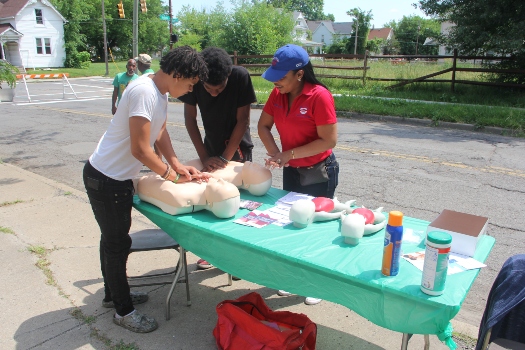By Journal Staff Writer
A collaborative effort between the City of Toledo, Mercy Health, Community CPR, SafetyNest LLC, and the African American Male /Wellness Agency sought out to eliminate the health disparities that exist within the African American community. On Saturday, June 11, they pooled their resources, and converged on the Frederick Douglass Community Center, 1001 Indiana Ave.
Free health screenings, and CPR certifications, rounded off a day that also included information on mortgage assistance programs, summer youth programming, lead line replacement, and a talk from an emergency room doctor addressing some of the biggest health problems plaguing the African American community.
The brain child of Tyrone Alexander of the City of Toledo, he felt that other issues, particularly around the Frederick Douglass Center needed to be addressed, other than gun violence. He told The Toledo Journal that poor health fuels poverty, on top of violence, and he wanted to form a coalition that had a history of addressing the health disparities in the community.

Former Fire Chief, Brian Byrd, and current Public Safety Director said, since the Violence Interrupters have helped decrease the shootings in the area, the coalition felt a need to start addressing other problems.
Reggie Williams, executive director of the Frederick Douglass Center said the event was good for the area. “Anything that focuses on, and encourages people to take better care of their health is good.”
Stanley Thompson,an emergency room doctor from Memphis, Tennessee talked about Peripheral Artery Disease, PAD, which is a narrowing of the blood vessels, which ultimately reduces blood flow throughout the body.
He explained to his audience that African Americans are two times as likely to develop the disease, and four times as likely to develop it if they smoke. Diet, lack of exercise, and genetic predisposition are just three ways that cause the disease to develop. But he quickly pointed out that he doesn’t want people to assume that when they hear the word genetic, there’s nothing they can do about it; eating healthy, exercising, and regular doctor visits can all greatly reduce the chances of developing the disease.
After hearing Dr. Thompson’s talk, Racheal Lucas, and Jaronda McCall said they’re encouraged to change their lifestyle, for the better, and encourage family members to do the same.